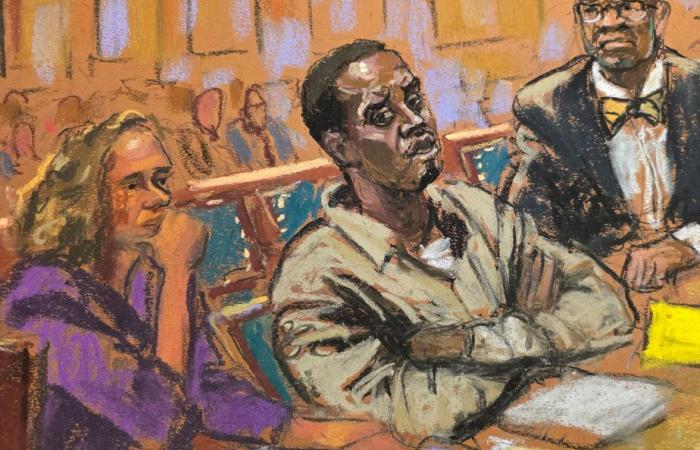(New York) Sean “Diddy” Combs was denied bail again Wednesday as he awaits trial on sex trafficking charges in May by a judge who cited evidence showing he posed a “serious risk » of witness tampering and evidence that he had attempted to conceal prohibited communications with third parties during his incarceration.
Posted at 8:10 p.m.
Larry Neumeister
Associated Press
U.S. District Judge Arun Subramanian ruled in a five-page order following a bail hearing last week. At the hearing, the hip-hop mogul’s lawyers argued that a US$50 million bail they had proposed would be enough to ensure their client does not flee and try to intimidate potential witnesses in the trial.
Two other judges previously agreed with prosecutors that the Bad Boy Records founder posed a danger to the community if not behind bars. Justice Subramanian agreed. “There is compelling evidence of Combs’ propensity for violence,” the magistrate wrote.
Combs’ attorneys did not immediately respond to messages seeking comment on the decision. Nicholas Biase, a spokesman for prosecutors, declined to comment.
Combs, 55, has pleaded not guilty to charges that he coerced and abused women for years, aided by associates and employees. An indictment alleges he silenced victims through blackmail and violence, including kidnapping, arson and physical beatings.
Last month, a federal appeals court judge denied Combs’ immediate release while a three-judge panel of the 2e U.S. Court of Appeals in Manhattan is considering his request for bail. That appeal was stayed while Judge Subramanian, newly appointed to the case after the previous judge stepped down, considered the bail application for the first time.
Arun Subramanian said he looked at all the bail arguments and the evidence supporting them from a new perspective to make his decision.
Prosecutors insisted that no bail conditions would be enough to protect the public and prevent the performer from I’ll Be Missing You to escape.
They claim that, even at a federal prison in Brooklyn, Combs orchestrated social media campaigns intended to influence potential jurors and tried to publicly release documents he believed could help his case. They also claim he contacted potential witnesses through third parties.
Combs’ lawyers say all of the alleged sexual abuse described in the indictment occurred during consensual adult relationships and that new evidence refutes allegations that Combs used his “power and prestige” to incite drugged female victims engaged in elaborate sexual performances with male sex workers at parties known as “Freak Offs.”
The judge said the evidence shows Combs poses a “serious risk of witness tampering,” particularly after he communicated over the summer with a grand jury witness and deleted some of his messages with the witness.
The magistrate also cited evidence showing that Combs violated Bureau of Prisons regulations while on remand at the Metropolitan Detention Center in Brooklyn when he paid other inmates to use their telephone numbers so he could call people who were not on his approved contact list.
He said there was also evidence that he asked his family members and the defense attorney to add other people to the three-way calls so that their communications would be harder to trace and that he made efforts to influence the jury at his trial or to reach potential witnesses.
Mr. Subramanian argued that his “willingness to circumvent” prison rules to conceal communications was “strong evidence” that release conditions would not prevent similar behavior.
The judge also pointed out that defense claims that Combs had stopped using a particular telephone technique criticized by prosecutors were belied by the fact that Combs apparently used it again on Sunday, two days after his pretrial hearing. out on bail last week.
Even a bail proposal that would include the strictest form of home confinement seemed insufficient, the judge ruled.
“Given the nature of the allegations in this case and the information provided by the Government, the Court doubts the sufficiency of the conditions that would allow Combs and those he employs – such as a private security service – to be trusted to comply these conditions,” wrote Judge Subramanian.






